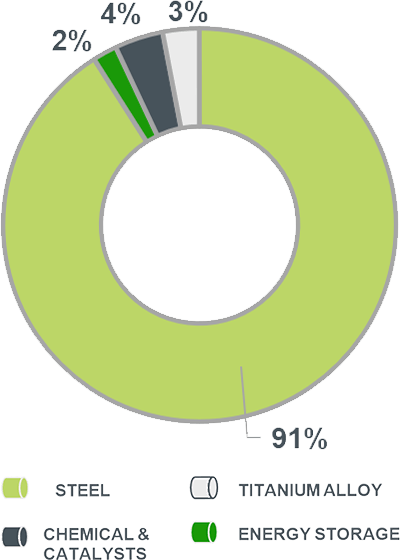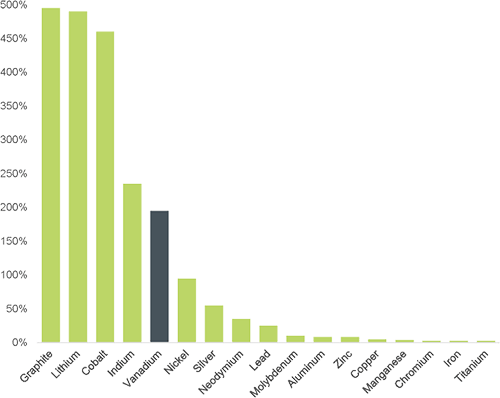Overview
Vanadium is a silver-grey metal that is malleable, ductile and
corrosion resistant. This makes it ideal
as an alloy for increasing the tensile strength of steel and other specialty metals.
Vanadium is used in materials that have important end uses
including:
- Steel alloys – vanadium plays an essential role as an alloy to increase the tensile strength of steel and provide resistance for use in buildings, bridges and tunnels.
- Titanium alloys – along with titanium and aluminium, it is used in key components such as landing gear, airframes and engine parts to provide ultra-high strength.
Industries that depend heavily on vanadium include construction,
aerospace, ship building, the automobile sector, wind turbines and industrial
tools.
Over 90% of the vanadium produced around the world today is used
as a high strength alloy in the steel and titanium industries. Demand in these markets is forecast to grow
steadily.
Vanadium consumption by applications

Source: Vanitec
Vanadium is also used in the chemicals industry and the rapidly
emerging energy storage sector. And whilst
the steel and titanium alloy markets will continue to be important for
vanadium, the global push towards clean energy and the requirement for long duration
utility-scale energy storage is expected to drive demand for vanadium in coming
decades.
A recent World Bank report, Minerals
for Climate Action: The Mineral Intensity of the Clean Energy Transition,
forecasts that to meet the growing demand for clean energy technologies, the
production of minerals such as graphite, lithium and cobalt will increase by
nearly 200 per cent by 2050. The
report estimates that 3 billion tonnes of minerals and metals will be
needed to deploy the wind, solar and geothermal power – as well as the energy
storage systems – required to meet the carbon reduction goals of the 2015 Paris
Agreement.
Vanadium is expected to be one of the major beneficiaries of the
transition to a clean energy future. The
World Bank estimates that the global adoption of renewable energy will also drive a
200 per cent rise in the annual demand for vanadium by 2050.
2050 annual demand from energy technologies as percentage of 2018 production

Source: World Bank Group – Minerals for Climate
Action: The Mineral Intensity of the Clean Energy Transition